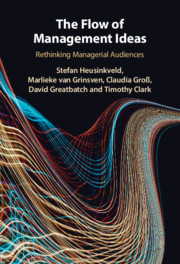Book contents
- The Flow of Management Ideas
- The Flow of Management Ideas
- Copyright page
- Contents
- Figures
- Tables
- Acknowledgements
- 1 The Flow of Management Ideas
- 2 Studying Audiences
- 3 Creating a Positive Atmosphere among the Audience
- 4 Conveying the Applicability of Ideas to Audience Members
- 5 Defining Audience Orientations
- 6 Understanding Audience Dynamism
- 7 Managerial Audiences in Organisational Contexts
- 8 Managerial Audiences and Fan Involvement
- 9 Conclusion
- Appendix A Overview of Informants
- Appendix B Glossary of Transcription Symbols
- References
- Index
4 - Conveying the Applicability of Ideas to Audience Members
Published online by Cambridge University Press: 22 May 2021
- The Flow of Management Ideas
- The Flow of Management Ideas
- Copyright page
- Contents
- Figures
- Tables
- Acknowledgements
- 1 The Flow of Management Ideas
- 2 Studying Audiences
- 3 Creating a Positive Atmosphere among the Audience
- 4 Conveying the Applicability of Ideas to Audience Members
- 5 Defining Audience Orientations
- 6 Understanding Audience Dynamism
- 7 Managerial Audiences in Organisational Contexts
- 8 Managerial Audiences and Fan Involvement
- 9 Conclusion
- Appendix A Overview of Informants
- Appendix B Glossary of Transcription Symbols
- References
- Index
Summary
In this chapter we ask: How do gurus present their ideas as being generally applicable, significant and potentially relevant to individual audience members? The chapter shows how management gurus use stories about change to communicate the successful application and adaptability of their ideas, to construct an ambiguity that allows scope for managerial audience members to tailor the ideas to different contexts. Regardless of whether these stories are framed as epiphanic or non-epiphanic, they exhibit three common practices. First, the stories exemplify the gurus’ ideas by focusing on a particular case and on singular themes, making them more easily apprehensible and enabling the audience to collectively concentrate on a narrow set of events. Second, the stories are told in an engaging and entertaining manner, which heightens audience attentiveness and thereby makes the stories more memorable. Third, following the stories, gurus move from the particular to the general in order to demonstrate the applicability of the ideas exemplified by the stories to a wide range of contexts. This generally coincides with, and is marked by, a shift to a serious (or more serious) footing.
Keywords
- Type
- Chapter
- Information
- The Flow of Management IdeasRethinking Managerial Audiences, pp. 71 - 86Publisher: Cambridge University PressPrint publication year: 2021

